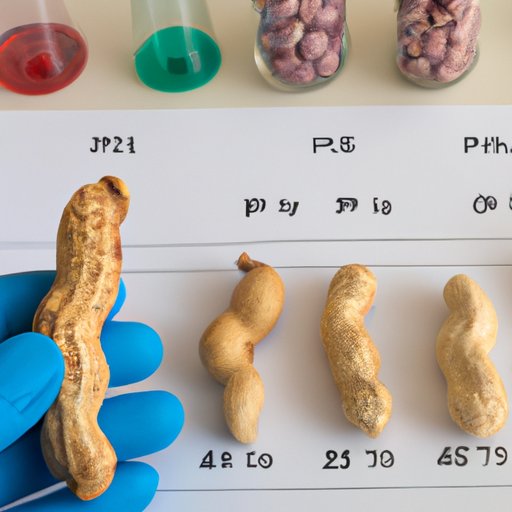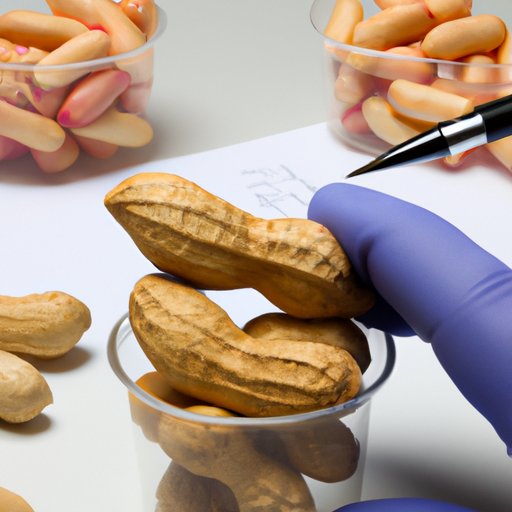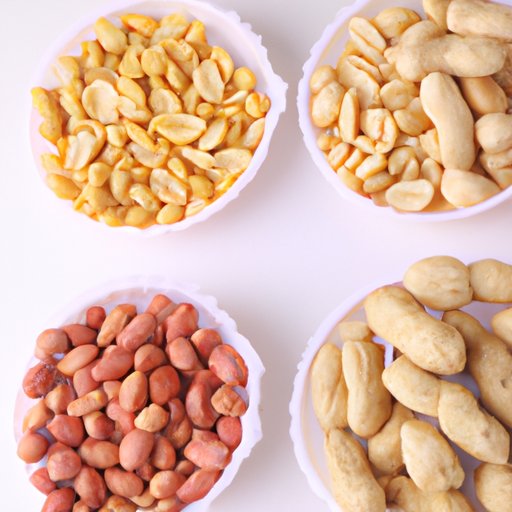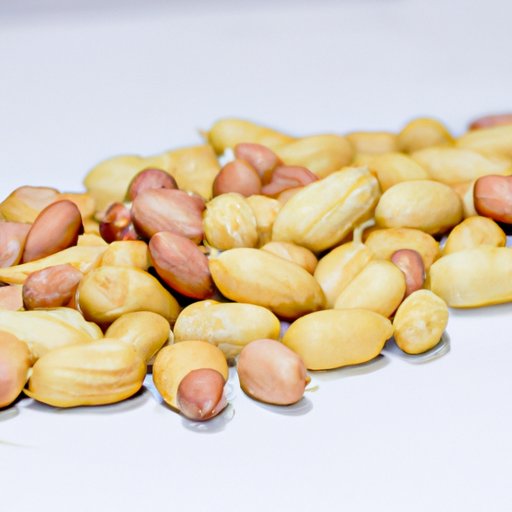Introduction
Peanuts are a popular type of nut that is enjoyed around the world. They are packed with essential nutrients and have been linked to various health benefits. But what exactly makes peanuts healthy? In this article, we will explore the nutritional profile of peanuts, their potential health benefits, and any risks associated with them. We will also look at how peanuts compare to other nuts and seeds, and identify some healthy peanut snack options.

Analyzing the Nutritional Profile of Peanuts
Peanuts are an excellent source of macronutrients, vitamins, minerals, and other beneficial compounds. Here is a closer look at the nutritional profile of peanuts.
Macronutrients
One ounce (28 grams) of peanuts contains approximately:
- 164 calories
- 14 grams of fat
- 6 grams of carbohydrates
- 7 grams of protein
Vitamins and Minerals
Peanuts are an excellent source of several vitamins and minerals. One ounce (28 grams) of peanuts provides approximately:
- 17% of the daily value (DV) for niacin
- 12% of the DV for folate
- 11% of the DV for thiamine
- 10% of the DV for vitamin E and magnesium
- 7% of the DV for phosphorus, copper, and manganese
Other Nutrients
Peanuts are rich in several other beneficial compounds, including resveratrol, phytosterols, and polyphenols. These compounds may help reduce inflammation and protect against disease. Peanuts also contain significant amounts of fiber and antioxidants, which can help promote digestive health and reduce the risk of chronic diseases.
Exploring the Health Benefits of Peanuts
Eating peanuts regularly has been linked to several health benefits. Let’s take a closer look at how peanuts can benefit your health.
Heart Health
Studies suggest that eating peanuts or peanut butter may help reduce the risk of cardiovascular disease. One study found that consuming one ounce (28 grams) of peanuts five times per week was associated with a 21% lower risk of death from heart disease.
Weight Management
Peanuts are high in protein and healthy fats, making them a good choice for weight management. Several studies have found that eating peanuts can help reduce hunger and increase feelings of fullness, leading to greater weight loss over time.
Cognitive Function
A recent study found that eating peanuts may improve cognitive function. The study found that older adults who ate peanuts six days per week had better thinking skills than those who did not eat peanuts.

Investigating Potential Health Risks of Peanuts
Although peanuts are generally considered healthy, there are some potential risks associated with consuming them. Here is what you need to know about the potential risks of eating peanuts.
Allergies
Peanuts are one of the most common food allergens. According to the Centers for Disease Control and Prevention (CDC), an estimated 3 million Americans suffer from peanut allergies. It is important to note that even trace amounts of peanuts can trigger a reaction in those with a peanut allergy.
Arsenic Content
Peanuts are known to contain arsenic, which is a toxic compound that can be harmful in large amounts. However, the levels of arsenic in peanuts are relatively low and unlikely to cause adverse health effects. Nevertheless, it is best to limit your intake of peanuts if you are concerned about arsenic.
Aflatoxins
Aflatoxins are toxic compounds produced by certain fungi that can be found on peanuts. Fortunately, modern processing techniques have greatly reduced the risk of aflatoxin contamination. Still, it is important to buy peanuts from a trusted source to ensure they are safe to consume.
Examining Peanuts as a Plant-Based Source of Protein
Peanuts are a great source of plant-based protein. Here is what you need to know about the quality of proteins in peanuts.
Nutrient Composition
Peanuts are an excellent source of plant-based protein, providing 7 grams of protein per one-ounce (28-gram) serving. They are also rich in healthy fats, fiber, and other essential nutrients.
Quality of Proteins
According to a recent study, peanuts provide high-quality proteins that are comparable to animal proteins. The study found that peanuts are a highly digestible source of protein and can provide essential amino acids to meet dietary needs.
Digestibility
Peanuts are easy to digest and absorb. Studies show that peanuts can be quickly and efficiently digested in the body, making them a great source of plant-based protein.

Comparing Peanuts to Other Nuts and Seeds
Peanuts are often compared to other nuts and seeds. Here is how peanuts stack up against some of the other popular options.
Macronutrients
When comparing macronutrient content, peanuts are similar to other nuts and seeds. Almonds, walnuts, and pumpkin seeds all provide approximately the same amount of calories, fat, carbohydrates, and protein per ounce (28 grams).
Vitamins and Minerals
In terms of vitamins and minerals, peanuts are higher in niacin, folate, and thiamin than other nuts and seeds. Almonds, walnuts, and pumpkin seeds are higher in vitamin E and magnesium, however.
Other Nutrients
When it comes to other beneficial compounds, peanuts are higher in resveratrol, phytosterols, and polyphenols than other nuts and seeds. Almonds, walnuts, and pumpkin seeds are higher in fiber and antioxidants, however.
Identifying Healthy Peanut Snacks
If you’re looking for a healthy snack, peanuts can be a great option. Here are some healthy peanut snack ideas.
Unsalted Peanuts
Unsalted peanuts are a great way to get the health benefits of peanuts without added sodium. Eating unsalted peanuts can help reduce your overall sodium intake, which is important for maintaining heart health.
Peanut Butter
Peanut butter is a tasty snack that provides protein, healthy fats, and other essential nutrients. Just make sure to choose a variety that is made with only peanuts and no added sugar or trans fats.
Roasted Peanuts
Roasted peanuts are a delicious and crunchy snack. Look for varieties that are roasted in oil and lightly salted for maximum flavor. Avoid varieties that are heavily salted or roasted in butter or margarine.
Conclusion
In conclusion, peanuts are a nutrient-dense food that can provide many health benefits. Eating peanuts regularly may help reduce the risk of cardiovascular disease, aid in weight management, and improve cognitive function. However, it is important to be aware of the potential risks associated with eating peanuts, such as allergies and arsenic content. When choosing a snack, opt for unsalted peanuts, peanut butter, or roasted peanuts. By making these healthy choices, you can enjoy the benefits of peanuts while minimizing the risks.
(Note: Is this article not meeting your expectations? Do you have knowledge or insights to share? Unlock new opportunities and expand your reach by joining our authors team. Click Registration to join us and share your expertise with our readers.)
